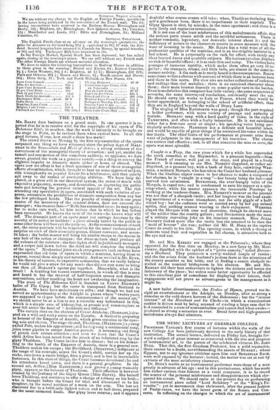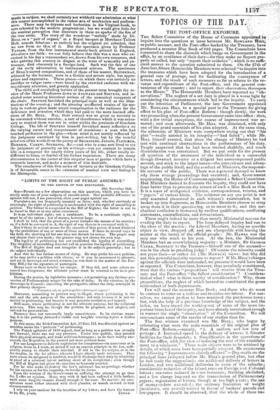THE MUSIC LECTURES AT GRESHAM COLLEGE.
PROFESSOR TAYLOR'S first course of lectures within the walls of the new College has been judiciously devoted to the early history of that institution. The second lecture, delivered on Friday last, brought for- ward a subject of great interest as connected with the rise and progress of instrumental art, in the person of the celebrated virtuoso Dr. Joins' Bum.. That this, the first Gresham Professor, has a solid reputation, there cannot be a doubt, notwithstanding the sneers of BURNEY ; whose flippant, not to say ignorant criticism upon him and SEBASTIAN Bear, were well exposed by the lecturer : indeed, the matter was set at rest by extracts of the most satisfactory character.
Dr. Btmes merits as an instrumental performer were those of a man greatly in advance of his age : and in this prefiminence, which has made him rather curious than famous as a vocal composer, is to be traced the source of the personal misfortunes and disappointments which che- quered his career. We should smile at the present day on performing an instrumental piece called "Lord Salisbury" or the "King's Fa- vourite": yet in movements thus christened, after the present fashion of Psalm-tunes, we have the latent germ of the Sonata and Con- certo. In reflecting on the changes to which the art of instrumental
music is subject, we shall certainly not withhold our admiration at what this master accomplished in the rudest tera of mechanism and perform- ance. There may be dryness and barbarism in his Virginal-book, to ears schooled in the modern progressions ; but we would give little for the musical perception that discovers in them no sparks of the fire of the true artist. The story of the wondrous "melody" made by Dr. BULL on a "pair of organs," at a Royal banquet at Merchant-Tailors Ball. sounds fabulous : so entirely has the original art subsided, that we can form no idea of it. But the specimen given by Professor TAYLOR, from the first instrumental music-book printed in England, stimulates our faith : we can fully believe that this was a man who ex- ercised in his day a transcendent art, drawu from his own resources, aid who quitting this country in disgust at the want of sympathy and pa- tronage, died obscurely in a foreign land. Such was the fate of one of the early adventurers in instrumental science. The specimens of BULL'S sacred compositions, and of those of his master, BLITHEMAN, adduced by the lecturer, were in a Gothic and severe style, but appro- priate and expressive. These pieces—in which there was certainly no sacrifice to vulgar taste—were heard by the crowded audience with ex- tracrdinary attention, and greatly applauded.
The third and concluding lecture of the present term brought the re- view of the Music Professors down IO AYLWARD and STEVENS, and in- cluded some amusing historical notices of the unmusical occupants of the chair. STEVENS furnished the principal topic as well as the illus- trations of the evening ; and the pleasing unaffected strains of his me- lody in various glees made ample compensation to the audience for the deference and attention which they had paid to the more learned effu- sions of Dr. BULL. Nay, their ecstacy was so great as scarcely to be contented without encores; a sort of interference which it was neces- sary to remind them was not in order within the precincts of Gresham College. The life of STEVENS himself furnished many reflections on the varying nature and temperament of musicians : a man who had touched perfection in the glee—whose mind is not merely reflected by the judgment exercised by him in part-writing, but by the tasteful selection of his words from the poetry of SHAKSPERE, JostsoN, FLETC,HER, HERRICK, CAREW, SUCKLING, &C.—and who in some sort lived to see the judgment of posterity on his writings—was yet content to remain idle as a composer for nearly thirty years of his life, either totally in- different to fame, or fearful of his former reputation. There are many circumstances in the career of this singular man ot genius 'which have a romantic interest, and make a memoir of him desirable.
The conclusion of this first series of lectures at the Gresham College is of favourable omen to the extension of musical taste and feeling in the Metropolis.



























 Previous page
Previous page